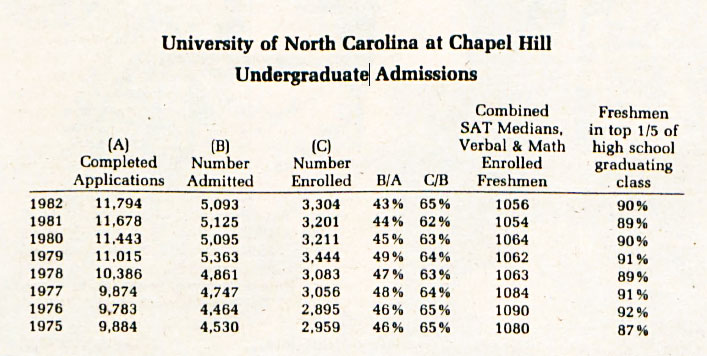Admissions: Changes to Be Considered
Posted on March 3, 1983From the University Report (published by the GAA 1970-94)
Nowhere is spring quite as arresting as in Chapel Hill. As dogwoods bloom and azaleas reveal their violet magic, the campus awakens from winter’s slumber to the songs of robins and the flirting howls of wandering dogs. This spring will be particularly special for 2,300 undergraduates and nearly 1,100 graduate students, for Commencement means that this will be their last spring as students in “the southern part of heaven.”
We congratulate all our new degree holders and welcome them to the ranks of Carolina’s large and growing alumni family.
This spring is also special for another group of graduates — high school seniors anxiously awaiting word whether they are to be admitted to the University’s class of ’87. With over 11,000 applications received for 3,200 spaces in the freshman class, many applicants will receive disappointing news.
Because of the obvious challenge this presents our admissions office, there was recently created an alumni-student-faculty advisory sub-committee of the University’s admissions committee to advise and assist with the particular issues affecting undergraduate admissions. GAA’s first vice president, Elizabeth S. (Pepper) Dowd, Class of ’53, represents our 146,000 alumni on this subcommittee.
There are two issues which Director of Undergraduate Admissions Richard Cashwell has already highlighted and which will receive early attention. The first is the 15 percent cap on out-of-state admissions, with nonresident sons and daughters of alumni absorbing more and more of the approximately 480 spaces reserved for out-of-state students. By mandate of the Board of Trustees, alumni children living outside of North Carolina are allowed to compete with North Carolina residents for admission. Once admitted, they are counted in the 15 percent allocated for out-of-state admissions. With nearly one-half of our alumni now living outside ‘of North Carolina, it won’t be long before all of the spaces for out-of-state students will be taken by sons and daughters of non-resident alumni.
After out-of-state Morehead Scholars, student athletes, other special scholarship winners, and sons and daughters of alumni are added, there are usually no more than 200 spaces left for the 5,000 applicants seeking admission from out-of-state. Clearly, to be admitted as an out-of-state student without qualifying in one of the above categories, suggests that an applicant is nearly super-human!
Two possible solutions to this problem are to omit alumni children from the 15 percent and also to exclude from the quota, as the UNC-CH graduate schools now do, any student recruited by the University and awarded a scholarship.
Also needing review is the effect of the projected decline in the number of students graduating from high schools in North Carolina. In 1982, roughly 74,000 students graduated in North Carolina, of whom roughly 8 percent applied to the University and about two-thirds were admitted. By 1992 it is anticipated that only 62,000 high school students will graduate. Assume, as is now planned, that the size of our freshman class remains constant at 3,200. If just 8 percent of the North Carolina high school seniors continue to apply, we will find in 1992 that the University is accepting over 80 percent of those applying, and that the quality of the freshman class will decline.
North Carolina alumni can be of particular assistance with this latter problem by assisting the University in recruiting better students for the University. Younger alumni can help by sharing the Carolina experience with high school students who are trying to make the difficult decision of selecting a college. I am encouraging our local alumni chapters to become actively involved in this effort.
Attending Carolina is special. Youngsters across the state, and indeed across the country, aspire to come to Carolina. They work hard to gain admission. This is as it should be, and in keeping with the intentions of the founding fathers who established the “first state University.” We must continue to examine our admissions policies and consider adjustments when demographics warrant changes. Along the way, we must take care to assure that all. those who undergo our admissions process are treated fairly and with genuine concern. We cannot admit all who apply, but we must be sensitive, warm and thoughtful toward them.
There will be many more springs and commencements at Carolina. Let each of us continue to make Chapel Hill and the University a special place, for those who come as students – but also for those whose dreams of admission may not be realized. That is our charge and our tradition.
Yours at Carolina,

Douglas S. Dibbert ’70
